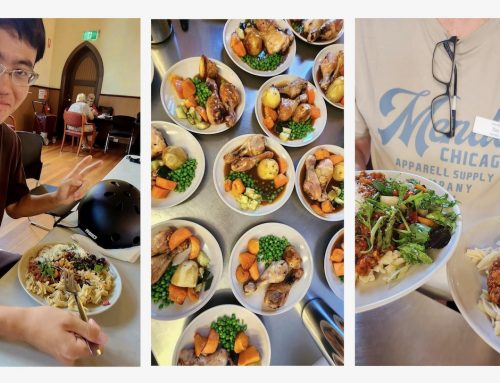We often talk about urban spirituality in our work in Olive Way. This was highlighted in our tri-annual report that was compiled a couple of years ago by Lew Hess. In it Lew recommended that we explore what urban spirituality looks like from our unique vantage point in Olive Way. And yet, spirituality is a surprisingly difficult thing to quantify, let alone defining what we mean by ‘urban spirituality’. We often speak of ‘spirituality’ in everyday conversation, but what exactly do we mean by it? Although it’s probably one of the more socially acceptable ways of speaking about religion in our community today, this word is also being gradually marginalised in our increasingly hyper-rationalistic world. Some researchers even consider spirituality to be a form of ‘benign psychosis’.
When I think of the ‘spirituality’ of Olive Way it is incredibly difficult to define. The Olive Way guests are not necessarily bound together by a spiritual need, at least not explicitly. And yet it is there, hidden in the cracks.
One of the ways I have come to think of ‘spirituality’ is as the ‘yearning for something more that we give expression to’. Some of us might create practices that help us to connect this yearning to an experience, or create an experience that connects with the yearning; which brings us a little closer toward the idea of ‘religion’. This deliberately broad understanding gives me a way of thinking about the role that I have as ‘pastor’. My understanding of pastoral work, which involves pastoral care, draws upon the spiritual, moral, ethical, as well as the sacramental resources that our faith provides to care for and nurture people. In the case of Olive Way this means the spiritual care of people of different (or no) faith perspectives. There are many other resources we might also draw upon, and care is not restricted to only using these resources, but these are a kind of base-line that we can turn to.
Urban spirituality, in my renewed understanding, is the kind of yearning that arises in an urban environment. This includes the kind of questions we ask about ourselves, about who we are, about what are meant to do in life, that can be different in an urban environment. Urban spirituality also considers the nature of the yearning as it arises in the urban environment. For example, if I am surrounded by people, why do I feel so lonely? This is a uniquely urban problem. Similarly, consumerism represents another type of ‘yearning’, one that is often artificially created in order to sell products, promote, entertain, divert and capture our attention, and convince us that we need something we’ve never thought we needed. While this may not be what we typically mean by spirituality, it has eclipsed, and in large part replaced, much of what traditional religion would attempt to respond to in humanity.
Olive Way people gather primarily for food — it’s quite simple. But we seek to respond to much more than that. This was highlighted to me when I was chatting to one of our homeless guests a while back. We were talking about all the places where you can get a feed around Melbourne, and all the places he goes to get food. He listed several places that he puts on his itinerary, but he then said, “It’s not just about the food, it’s about having human contact. Without it I go a bit stir-crazy.” For him, who may appear a gruff ‘loner’, that yearning is still there and expresses itself in his need for human contact. Places like Olive Way help him to respond to that yearning; his turning up every day we’re open is how he gives expression to it and it becomes a part of his practice and routine.
Peter Blair, Olive Way Pastor
Photos by Naomi Kim






Leave A Comment